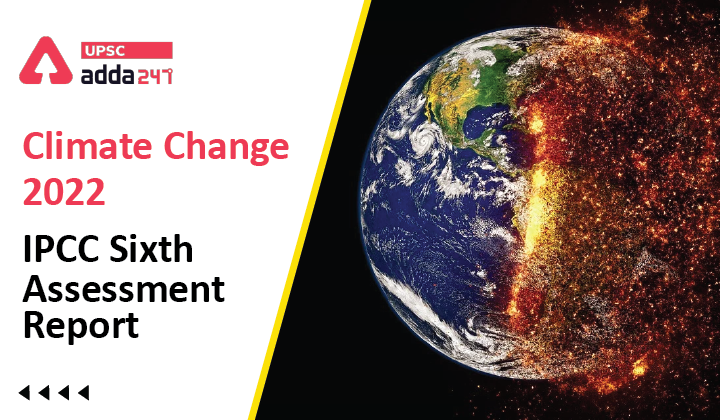Table of Contents
IPCC Sixth Assessment Report: Relevance
- GS 3: Conservation, environmental pollution and degradation, environmental impact assessment.
Climate Change 2022: Context
- IPCC has recently reported the second part of the Sixth Assessment Report (AR 6 WGII) that lays focus on climate change impacts, risks and vulnerabilities and explores options to adapt.
IPCC: About sixth assessment report
- The first part of the report was released in August 2021. It talked about the scientific basis of climate change.
- IPCC will release its third and final part of the report in April 2022.
- The first Assessment Report by IPCC had come out in 1990.
- The reports were then released in 1995, 2001, 2007 and 2015, which form the basis of the global response to climate change.

AR 6 WGII: Key findings
Impact on health
- IPCC has for the first time included the regional and sectoral impacts of climate change and the health impacts.
- For example, the report states that Mumbai will be affected by sea-level rise, while Kolkata is at risk of storms. It provides a clearer vision on what needs to be done regarding these threats, and was not done in previous reports.
- The report states that climate change and related extreme events will significantly increase ill-health and premature deaths from the near- to long-term.
- The report also says that that vector-borne diseases like dengue and malaria will increase.
- Besides, mental health challenges, including anxiety and stress, are expected to increase under further global warming in all assessed regions, particularly for children, adolescents, elderly, and those with underlying health conditions.
Climate Transparency Report 2021
Impact on food system
- The report has cautioned that climate-related risks to agriculture and food systems in Asia will further escalate with the changing climate.
- As far as India is concerned, rice production can witness a decrease from 10 to 30 per cent whereas maize production can witness a decrease from 25 to 70 per cent assuming a range of temperature increase from 1 degree Celsius to 4 degrees Celsius.
Ecological Threat Report 2021
Wet-bulb temperatures
- The report has also warned that if emissions continue to rise, wet-bulb temperatures will approach or exceed the unsurvivable limit of 35 degrees Celsius over much of India, with the majority of the country reaching wet-bulb temperatures of 31 degrees C or more.
- Wet-bulb temperatures is a measure that combines heat and humidity.
- A wet-bulb temperature of 31 degrees Celsius is extremely dangerous for humans, while a value of 35 degrees Celsius is unsurvivable for more than about six hours, even for fit and healthy adults resting in the shade.
- Currently, wet-bulb temperatures in India rarely exceed 31 degrees Celsius, with most of the country experiencing maximum wet-bulb temperatures of 25-30 degree Celsius.

Impact on water stress
- The report further says that both climatic and non-climatic drivers such as socio-economic changes have created water stress conditions in both water supply and demand in all sub-regions of Asia.
- The international transboundary river basins of Amu Darya, Indus, Ganges and inter-state Sabarmati-river basin in India could face severe water scarcity challenges due to climate change.
Global Warming and Permafrost
Impact on economy
- The report highlights that, high levels of warming could cause a global GDP decline of 10-23 per cent by the end of the century, compared to a world without warming.
- Several major economies could see even larger economic declines because of climate change.
- According to a study cited in the report, if emissions are high, GDP losses by the end of the century could be up to 42 per cent in China and 92 per cent in India.
Read current affairs for UPSC
| SWIFT Ban on Russia | Russia Ukraine War | SPARSH: System for Pension Administration | Fair and Remunerative Prices: Maharashtra Issues Resolution | Chernobyl Disaster: Russian Invasion, Causes and Consequences |
| EX DHARMA GUARDIAN-2022 | NBFC to Implement Core Financial Services Solution by 2025 | Sustainable Cities India Program | DEVAYATANAM | Conference on Indian Temple Architecture |
| Brick Kilns in India: MoEFCC Releases New Guidelines | Ex Cobra Warrior 22 | Draft Integrated Plant Nutrition Management Bill 2022 | National Strategy on Additive Manufacturing |
| MILAN 2022 | GOBAR DHAN Scheme: PM Inaugurates Asia’s Biggest Biogas Plant | Jal Jeevan Mission | Har Ghar Jal by 2024 | Annual Frontier Report 2022 |



 TSPSC Group 1 Question Paper 2024, Downl...
TSPSC Group 1 Question Paper 2024, Downl...
 TSPSC Group 1 Answer key 2024 Out, Downl...
TSPSC Group 1 Answer key 2024 Out, Downl...
 UPSC Prelims 2024 Question Paper, Downlo...
UPSC Prelims 2024 Question Paper, Downlo...





